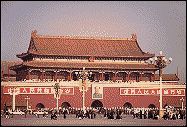Click here for www.PriceLine.com

Airports and freeways are under construction in Beijing and money is pouring in faster than you can say dim sum. The street facing the splendid Shangra-La Hotel is a maze of cars, cabs and bicycles, all vying for space like a frenzied checker game.
Be Advised:
Traffic - Beijing is a one-day city similar to Athens, Greece. It is a stop-over on your way to the Yangtze River and a Regal China cruise. Choked with traffic, like most large cities, the streets are jammed with vehicles which are quickly replacing bicycles. Pedestrians beware.
Pollution - If there was an enforced litter law and a powerful Chinese Environmental Protection Agency, most of the 1.2 billion citizens would be incarcerated along with the industrial powerhouses. The dust from the burning of soft coal coats the city like a tattered old blanket. Breathing Beijing air for a day, concluded a recent study, is the equivalent of smoking three packs of unfiltered cigarettes.
Language - Beijing remains one destination in the world where it is practical--and almost necessary--to travel with a guide or tour leader. China has an impregnable bureaucracy, is not yet geared for individual spontaneous travel, and the language is a tremendous barrier.
Tap Water - Don't think about it. Bottled water will save your stomach and your holiday.
Don't Miss:
The infamous Tiananmen Square, the heartbeat of the city and the world's largest public square is dotted with monuments, an exotic mix of humanity flying colorful kites, snapping photos of one another with Mao's portrait as a backdrop, and the Mao Zedong Mausoleum where the body of Mao can be viewed.
The Forbidden City, adjoining Tiananmen, was built in the early 1400s and opened its gates to the first influx of visitors in the 1970s.
It is easy to be overwhelmed by the maze of well-preserved tile-roofed, palaces, museums, halls, gates, passageways and marvelous statuary. History buffs joyfully get lost in the maze of buildings, all with a story to tell. Guides discuss a book load of detail about the buildings, the art and the people who once lived here. The vast puzzle will fall into place if you read a synopsis on the Forbidden City prior to your trip. Photography is permitted. A marvelous photo opportunity is the classic garden at the northern end of the complex where trees and plants cast shadows across weather-worn stones.
The 2,000-year-old Great Wall of China, 43 miles northwest of the city at Badaling, is an all-day trip. One of the few structures visible from the moon, the 3,900-mile-long wall should be at the top of your "visit" list.
A look at the Ming Tombs can be combined with the excursion. Be prepared for traffic, avoid weekends and establish the length of time at the wall.
In town you can pop from the Summer Palace, surrounded by a great garden adjoining Kunming Lake, to the 15th century Temple of Heaven and the splendor of grandiose Ming architecture. For first-timers, a touch of culture is at the Llyuan Theatre where the Beijing Opera performs nightly.
Temple hopping is best accomplished by visiting the northeast quadrant of the Inner City where some of the most historic buildings in China are located.
Included are the splendid Lama Temple and Capital Museum, the simple but pretty Confucius Temple and the nearby Great Bell Temple with the largest bell in China, dating to the 1400s, that sounded curfew nightly during imperial times. A cup of two of steaming Chinese tea, poured by costumed servers in a Teahouse is the perfect cap to a busy day in Beijing. The ancient custom places you in an ambience far removed from the West and is a relaxing respite from the bustling city.
The Chinese have practiced qigong to cultivate body, mind and spirit. Principles of qi and qigong form the foundation of Eastern energy arts including martial arts, Tips:
Extreme fashions should remain at home and could deny you entrance to religious shrines. InterPacific Tours International and Northwest Airlines offer extensive itineraries with a BestBuy Series and early bird savings. The Shangri-La Hotel, Beijing, 30 minutes from the commercial and business center and a short drive from the airport, offers a health club, fine service and dining. (800) 942-5050.
Spring and early autumn are the best times to visit. Summer is hot and dry. Low season prices in December, January, July, August and November are discounted. Contact Regal Cruises at (800) 808-3388 for a Yangtze River cruise; IPI at (800) 221-3594; Shangri-La Hotels, (800) 942-5050; Northwest Airlines, (800) 447-4747.